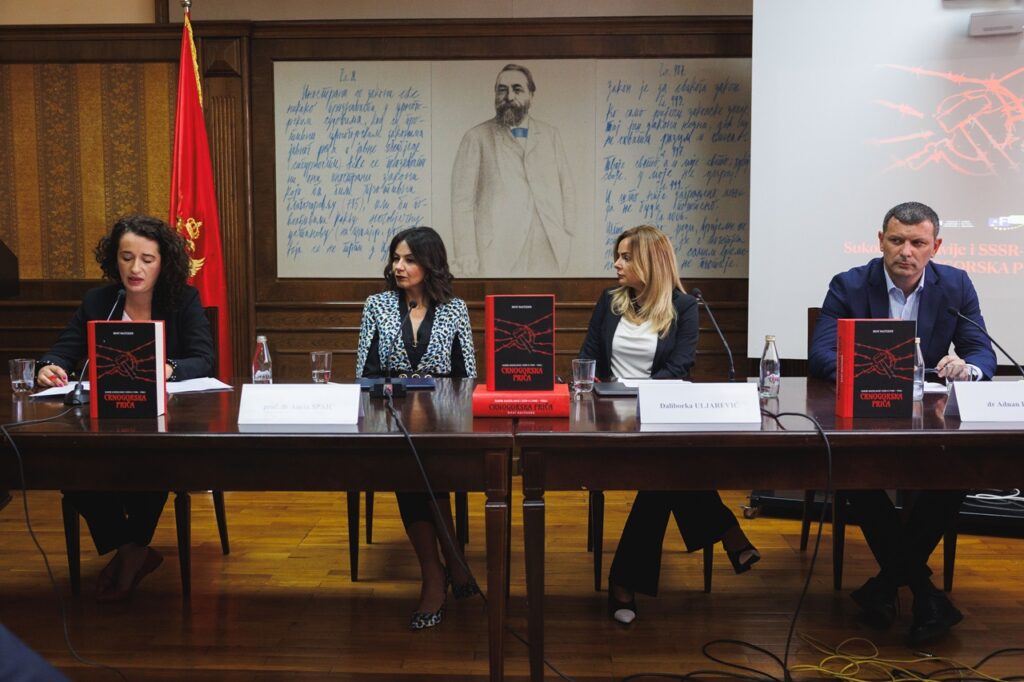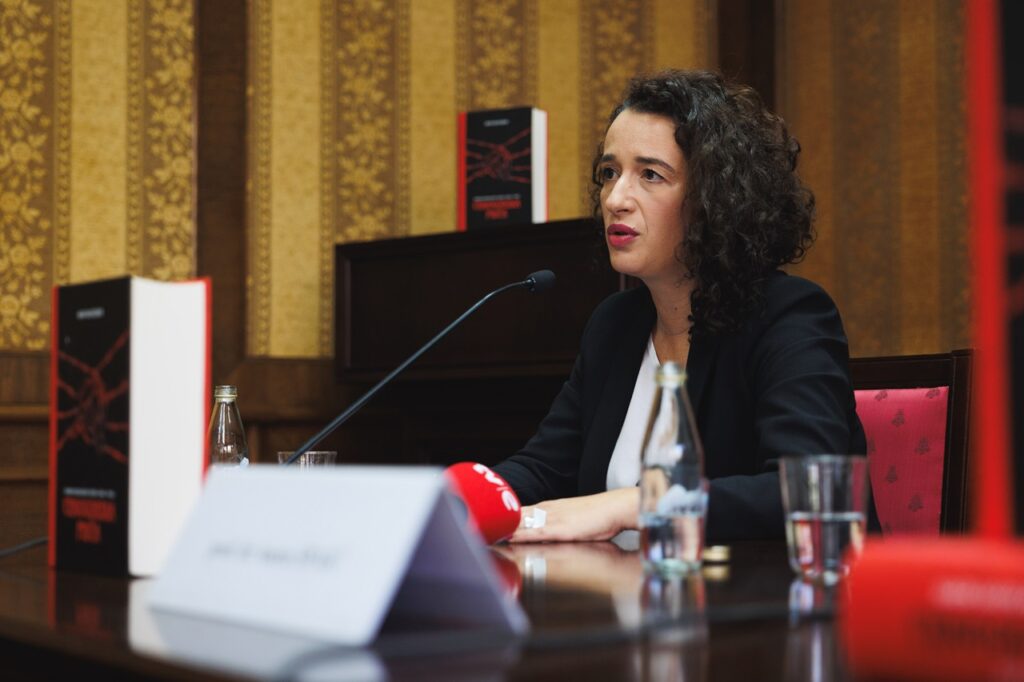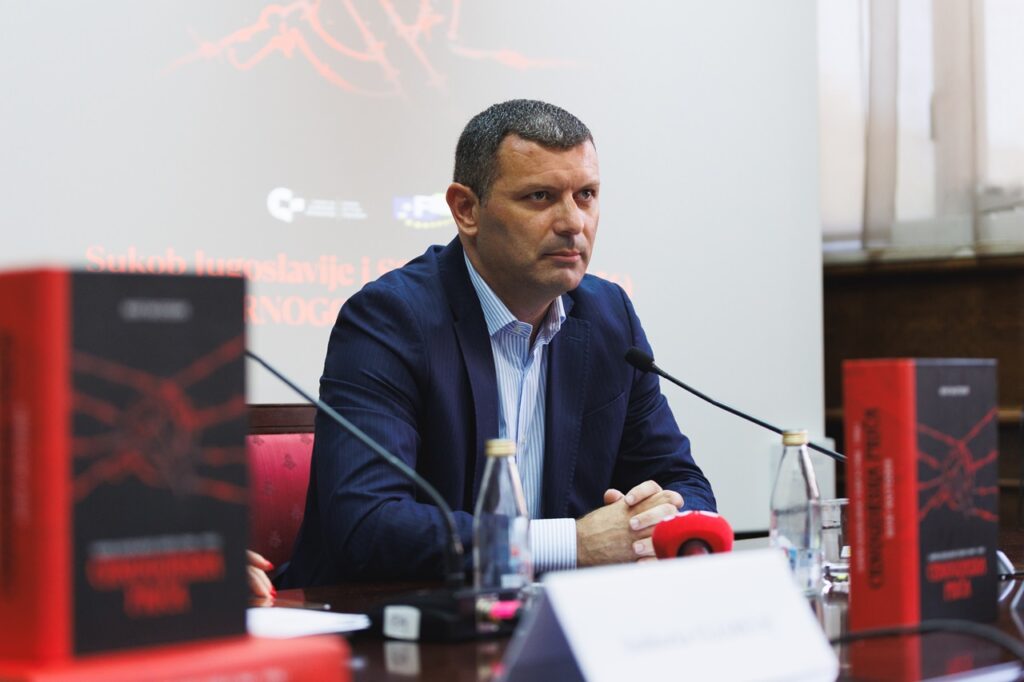‘’Rifat Rastoder lived human rights, both in his professional journalistic and later political engagement, during times of great trials, dedicatedly advocating for a multicultural and civic Montenegro. He fought against the suspension of memory that has been demanded here for decades and continues to be demanded. Quietly, but resolutely and bravely, he preserved and defended dignity, decency, dialogue, and understanding. This thread is key in this work as well, where he continues to shed light on crimes that erased humanity, suppressed freedom, and the right to one’s own political expression,” it was said, among other things, today at the promotion of the book “Conflict between Yugoslavia and the USSR (1948-1956): The Montenegrin Story,” by the late Rifat Rastoder, held in the packed Ceremonial Hall of the Faculty of Law at the University of Montenegro, organized by the Centre for Civic Education (CCE) and the NGO Forum of Bosniaks, who jointly published this posthumous work by Rastoder.
“The promotion of such an important, voluminous work of collected authentic documents and testimonies is taking place right here at our Faculty of Law, one of the most important higher education institutions in Montenegro. For half a century, since its inception, we have more or less successfully sought ways to host those pioneers of free, civic, and courageous thought in Montenegro, with expressions of respect, elevate them to the pedestal of the rare ones who lead us and leave a legacy for generations behind them. In the pantheon of those who built a civic, multi-religious, and free Montenegro was he – a journalist, athlete, publicist, politician,” said Prof. Dr. Aneta Spaić, Dean of the Law Faculty, reflecting on Rastoder’s work and engagement, reminding of his advocacy for the civic concept of the state of Montenegro, which fundamentally involves confronting its past. “I believe that this work of his, published by the Forum of Bosniaks and CCE, represents a lasting pledge for the only path to achieving key democratic values in this region, and that publishers are presenting it to us at the right time, reminding us all that sincere fighters for human rights last forever,” emphasized Spaić.
Melita Rastoder Ljaić, daughter of the late Rifat Rastoder, explained that the book was carefully and long prepared, with work beginning during Rifat Rastoder’s journalistic career. “Upon retiring, my father finally had the time to focus on organizing the carefully collected documentation, transcribing old articles and texts, and preparing and processing an incredibly large amount of unpublished material. Working on this for several years, he managed to complete the whole, simultaneously offering further guidance through several key questions,” said Rastoder Ljaić. “As a citizen, I feel it is my duty to speak more broadly about this issue and every other instance of inhumanity and attacks on human dignity in our Montenegro, so that we truly learn to fight for justice and the right of every person to their opinion, belief, or affiliation during difficult times,” she said. “My father was a good interlocutor and a good storyteller. From an early age in our family, little by little, we learned about the need to remain human at all costs. I am grateful to my father and best interlocutor for such a brave work and above all humane research,” concluded Rastoder Ljaić.
Daliborka Uljarević, Executive Director of CCE, particularly pointed out the holistic approach to the topic that Rastoder chose, offering insights from different perspectives and with rich archival material. “This book is a warning that it is crucial to remember and learn from the past to prevent the repetition of tragic events. The testimonies it brings are a sharp reminder of human suffering and the extreme measures taken during this period. The special quality of Rastoder’s depiction is enabling the understanding of the historical context and the impact of political decisions on processes and on the lives of individuals,” said Uljarević. “This book is not just a historical record but also a tribute to the resilience of those who survived challenging times, whose stories remain to be read, heard, and remembered. Personal stories of struggle, perseverance, and hope are proof of the strength of the human spirit to endure and overcome even the most unimaginable horrors, many of which occurred on Goli Otok,” said Uljarević, emphasizing that this book is a necessary read for anyone interested in the history of Montenegro and the broader Yugoslav context.
Dr. Adnan Prekić, the book’s reviewer and professor at the Faculty of Philosophy, highlighted the book’s unique methodological approach as a particular value. “A truly valuable and comprehensive book, there is no better documented case or book that I know of, which so comprehensively covers the year 1948. It should be noted that the book began to take shape in the second half of the 1980s. This was a period when the repressive system was loosening, there was more freedom and pluralism, and Rifat was dealing with human rights, which later defined his professional engagement,” said Prekić. He also made a brief historical overview of this period, stating that “this book reminds us of how futile all the successes of a political system are if it cannot guarantee the fundamental respect for human rights – as seen in authoritarian and totalitarian systems.”
“All happy families and democratic societies are alike, while each authoritative and totalitarian system is unhappy in its own way. Despite the difficult and sad stories and testimonies found in this book, we must never forget that personal destinies and the personal perspective of each individual are legitimate, but they cannot be the basis for creating historical truths and what should be learned from the past,” concluded Prekić.
Rifat Rastoder, a long-time political and state official, former journalist, publicist, cultural and sports worker, left behind an authentic body of work that reflects his struggle for human rights. The posthumously published “The Montenegrin Story” emerged as a reaction to the new polarization in Montenegro and was motivated by the historical conflict between Yugoslavia and the USSR (1948-1956) from the perspective of events and divisions in Montenegro. In elaborating the causes and consequences of this conflict, the author extensively used both historical materials and testimonies from numerous direct participants – prisoners, emigrants, interrogators, and camp managers, as well as various state and political actors of the time, making the book a unique collection of testimonies about these events and particularly about the suffering of people involved.
Maja Marinović, Programme associate



